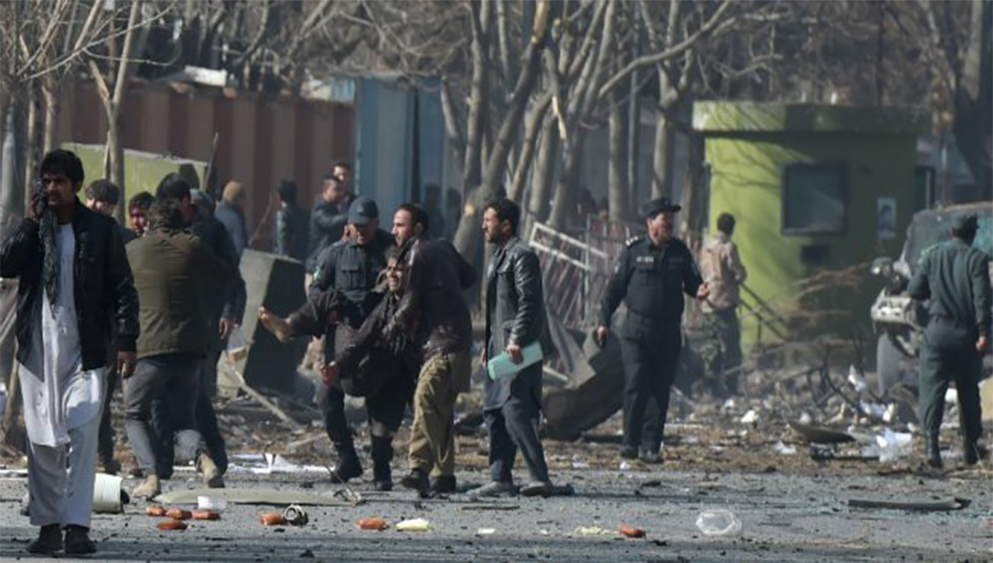A military academy in the Afghan capital, Kabul, has come under attack leaving at least two soldiers dead, days after more than 100 people were killed in an explosion near the interior ministry building.
Kabul was in despair on Sunday, a day after a Taliban suicide bomber killed more than 100 people and wounded at least 235 in the worst attack in the Afghan capital in months. Interior Minister Wais Barmak said the casualty toll had risen to at least 103 dead and 235 wounded. He said at least two vehicles painted as ambulances were involved in the attack, one of which blew up itself up, when it was stopped at a police checkpoint.
The attack in one of the most heavily protected parts of the city, close to foreign embassies and government buildings, was the worst seen in the Afghan capital since a truck bomb near the German embassy killed 150 people in May 2017. On 31 May 2017, a truck bomb exploded in a crowded intersection in Kabul, Afghanistan, near the German embassy killing over 150 and injuring 413, mostly civilians, and damaging several buildings in the embassy.
The series of attacks is an indicator of increasing organized violence inside Afghanistan. This is happening, while there is a heavy military presence of US and its allies. Some analysts are of the opinion that the presence itself is a reason of many reasons for non-state actors to justify their militancy. Others view it as a covert effort of some actors sitting inside Afghanistan to create a wedge between the host country and its neighbors, in particular Pakistan.
The Taliban have said their attack was intended as a message to U.S. President Donald Trump who last year sent more American troops to Afghanistan and ordered an increase in air strikes and other assistance to Afghan forces.
The solution may not be in adapting a strategic paradigm of violence and counter violence. It may be proposed to statke holders to tap the alternative course of action, the human aspect coupled with a strategy of inculcating soft power in play.
The land of Afghanistan is being viewed as a giant chessboard with different players using one or more players in their self-interest. The suffering people of Afghanistan are unfortunately seen nowhere in the machinations of the powers that be.
The case is unfortunately the same in Pakistan. Afghanistan’s largest neighbor Pakistan has been a major player in Afghanistan due to cultural, social and religious linkages. However, since the rise of Indian centrism in Afghan establishment and after the fall of the Taliban, these linkages have steadily being buried under the weight of mistrust and hate. The rise of militancy in both countries has also played a major role in the deterioration of ties between the two close neighbors.
However, there is also a share of blame for not using soft power by Pakistan effectively and efficiently. While economic considerations are an obstacle in massive aid to Afghanistan, Pakistan can use its historic ties on a people to people level to stave away the clouds of mistrust.
The horrific tragedy afflicting both nations is a place to start. Pakistan’s formidable social media while fragmented across political lines, does present a united front against both Indian and American transgressions. However, there is seldom any show of sympathy or grief when Afghans fall victim to brutal attacks. There is a stark need for a wide reaching social media campaign that can express sympathy and unity with Pakistan’s Afghan brethren.
But that's one step, such measures should not be restricted to Social media; the civil society should also take a fore front in expressing grief for Afghanistan. There is also a need for formulation of a “Pak-Afghan Unity Forum” where the common man from both sides can interact with each other. Investment in youth for both sides to interact and exchange ideas with each other is also one such step. Using non traditional means and making an effort to pave a pathway of solidarity and stability should be one of the main goals. Such endeavors will be helpful in lifting the onus of Pak-Afghan ties from the government of both states. Otherwise the Pak-Afghan relationship will remain shrouded in distrust and hostility towards each other.
